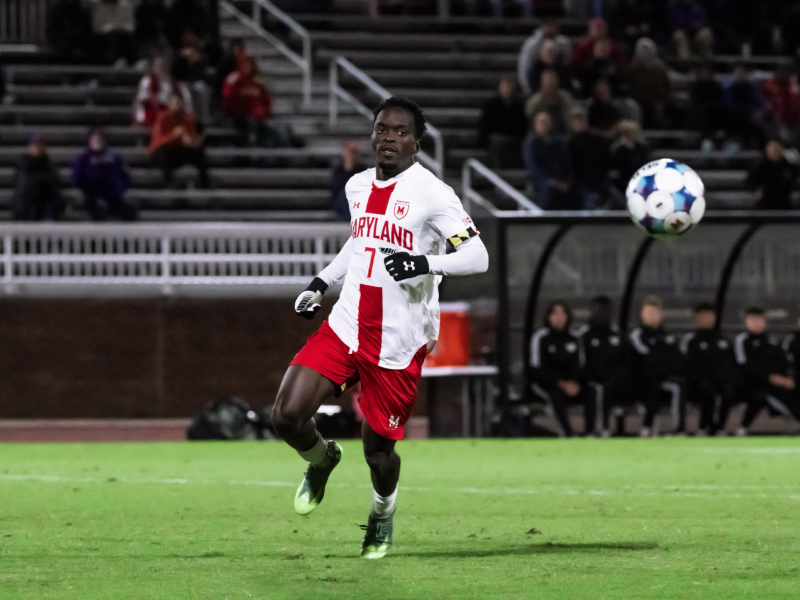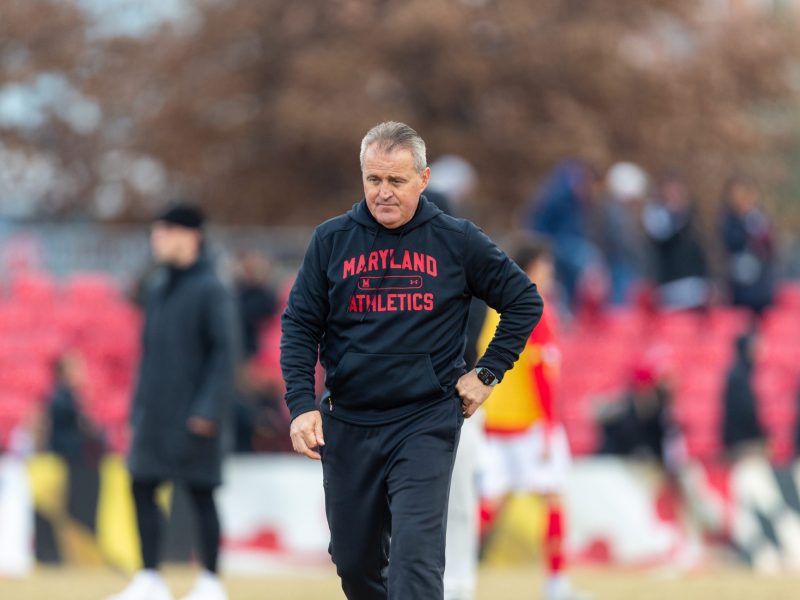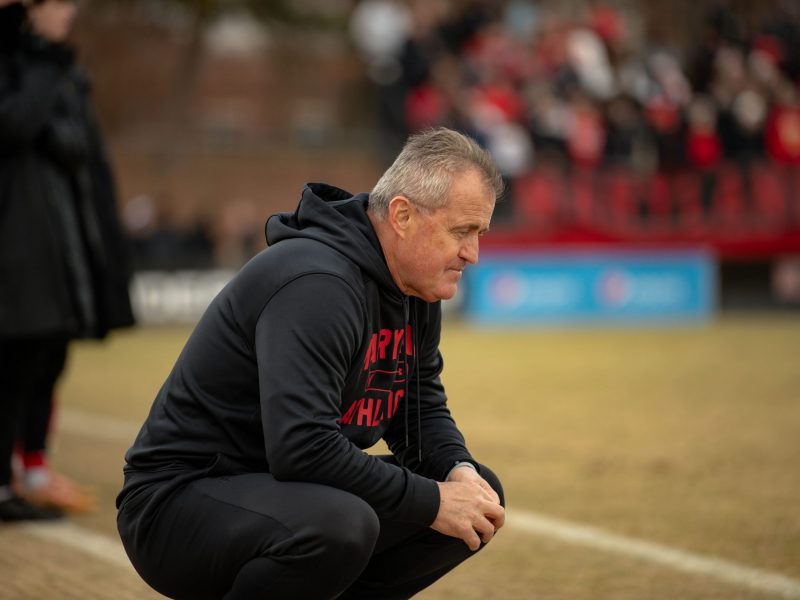Every November when Maryland men’s soccer midfielder Amar Sejdic’s birthday rolled around, he made a similar request.
Though Sejdic’s closet was full of soccer balls and cleats growing up, he always asked his parents for more. He didn’t want anything else. Soccer was his passion.
Sejdic grew up in a soccer family and was around the sport since birth. He moved to the United States from Germany at a young age and went back overseas to play, hardly seeing his family.
Sejdic didn’t live the normal life of a teenager, but he didn’t mind. He wanted to stand out on the soccer field.
Years later, Sejdic is one of the Terps’ most talented players on the country’s top-ranked team.
“He’s an extremely talented midfielder,” coach Sasho Cirovski said. “He’s got great feet and he’s got the ability to make that killer pass, or he can score a number of goals from distance.”
Growing up
As Sejdic learned to walk as a toddler at his home in Germany, he had a soccer ball at his feet.
Sejdic’s father, Rizah, played in the fourth division of German soccer while working on the side to provide for his family. Rizah couldn’t leave his son at home whenever he went to practice, so he brought his then-2-year-old with him.
Sejdic looked on as he watched his dad practice, and soon he began shooting the ball himself. By the time Sejdic was 4 years old, Rizah could tell his son had the potential to become a talented player.
“He developed a really nice technique for shooting,” Rizah said. “My friends playing with me in Germany, they always said, ‘Hey, he’s going to be a really, really good soccer player.’ It was just naturally.”
Sejdic played in a youth league with his dad as the coach, but when he was 6 years old, his family moved to Louisville, Kentucky. Sejdic’s parents saw America has a better opportunity for their son to pursue a career, even if it ended up being outside of soccer.
Sejdic learned a new language in an area that didn’t have the same interest in soccer as Germany. Still, his love for the sport didn’t falter.
When Sejdic got home from school, he threw his bag on his house porch and played soccer with his friends until dinner. He also spent much of his time training with his father.
Sejdic’s home had a small backyard, but it was enough for the pair to practice. Rizah put his son through dribbling drills, making him cut sharply with the ball to work on his change direction. He challenged his son by setting goals for him and giving him a reward if he accomplished them. For example, when Sejdic juggled the ball 50 times in a row for the first time, his father bought him a new ball.
The pair also played one-on-one against each other. Rizah told his son he’d never beat him, but with each victory Amar earned as he improved over time, he got to rub it in his dad’s face.
Off the field, the pair watched almost all of FC Barcelona’s games. Rizah wanted Amar to integrate some of the players’ tendencies into his own game, such as their smart movements, attacking mentality and the way they shot the ball.
“That’s kind of how my IQ came to the game,” Sejdic said. “The fact that he gave me the interest of watching all the time is how my IQ got a lot stronger. But it was always a competition between us two.”
Moving Out
Sitting on a bus in Holland as a 16-year-old, Sejdic was 4,000 miles away from his parents and one hour from his destination.
He moved to Holland on a study abroad program to play with U19 Vitesse FC. Not only did he leave his parents, but he also lived an hour away from his team’s soccer stadium, meaning he had to take two buses just to get to practice each day.
Sejdic didn’t care. He wanted to compete against some of the top talent in the world, and this was an opportunity.
“That was an unbelievable experience,” Sejdic said. “Leaving my parents at such a young age was kind of mindboggling. Most teenagers in my position wouldn’t have done that. It really prepared me to what level I was at on the international scale.”
Up until that point, Sejdic had been the star of all his teams, whether it was growing up or with the River City Rovers in Louisville. With Vitesse FC, Sejdic played as a substitute for the squad’s first five weeks of the season.
Sejdic wanted to make a bigger contribution, so he began arriving at practice an hour early each day to work on his game and stayed about 30 minutes after. Soon, he was named a starter, and he never gave up that role.
Sejdic had to return home about one year later due to problems with his Visa, but before leaving for Holland, Sejdic attended Cirovski’s soccer camp, and the pair stayed in touch. So when Sejdic returned to Louisville, he reached out to Cirovski, who put Sejdic in touch with Real Salt Lake City Arizona Academy’s coach.
Sejdic moved to Arizona for his senior year of high school, training with the squad that was at one point the nation’s top team in the U.S. Soccer Development Academy.
Similar to the environment he grew up in, Sejdic’s life revolved around soccer. Since Sejdic attended Vista Grande High School, which was located near the desert, he said there wasn’t much else to do other than play soccer.
So after school, that’s what he and his teammates did the rest of the evening.
“I just kept developing that knowledge I learned from Holland,” Sejdic said. “I took it to Arizona and we continued to be the top team in the country. It kind of helped me build a strong mentality and it showed me what I had to work for.”
Choosing the Terps
Former Maryland men’s soccer forward Sunny Jane, who played with the Terps from 2010 to 2013, grew up in the same town as Sejdic. So when Sejdic and his dad saw the atmosphere Jane played in at Ludwig Field, their interest for the Terps grew.
“I told him how we have the best fan base and how much he would love playing at Ludwig,” Jane said. “I told him how still to these days, I have memories of Ludwig and those memories stick with you forever. The way our soccer program works, we’re all brothers and once we leave Maryland, we’re always going to be a Terp family and always welcomed back.”
Sejdic also got an offer from the University of Louisville, his hometown school. But Rizah spoke with Marc Maguire, Jane’s guardian, throughout his son’s recruitment process, and Maguire couldn’t stop talking up Cirovski’s program.
Meanwhile, Sejdic and Jane spoke multiple times over the phone, talking about balancing school, soccer and a social life at Maryland.
The duo had never played together, but it played on different age groups of United 1996 FC growing up. Sejdic soon realized Maryland was his best shot to develop as a player, get a strong education and win a college national championship under Cirovski, who has coached dozens of professional players.
“It’s probably because of the whole atmosphere around the college,” Rizah Sejdic said. “He’s never complained about school.”
Making a difference
As Sejdic grew up, Rizah could hear thumps from the wall of his house at any time of the day.
His son struck the ball at the outside wall of his house for hours. He loved to shoot, and his peers noticed his skill quickly growing up.
With the Terps, Sejdic has displayed that talent often.
To score his first goal of the season Sept. 5, Sejdic struck the ball into the top right corner of the net from outside the box. He scored again in the run of play in Maryland’s 4-0 win over Northwestern on Friday. Midfielder Jake Rozhansky’s shot was blocked and the ball rolled to the top of the box. Sejdic sprinted to the ball before striking it into the back of the net.
The sophomore has recorded the second most points on the squad (12), which includes four goals. This week, he was named Big Ten Offensive Player of the Week for the second time in his career.
Sejdic said his experiences playing soccer from a young age and competing against top talent growing up have helped him become a key contributor for Maryland, which is unbeaten through 10 matches.
In one month, Sejdic will celebrate his 20th birthday. His childhood wish hasn’t changed.
“He didn’t care about anything else except soccer,” Rizah said. “I’ve been really happy with everything that’s going on so far.”



